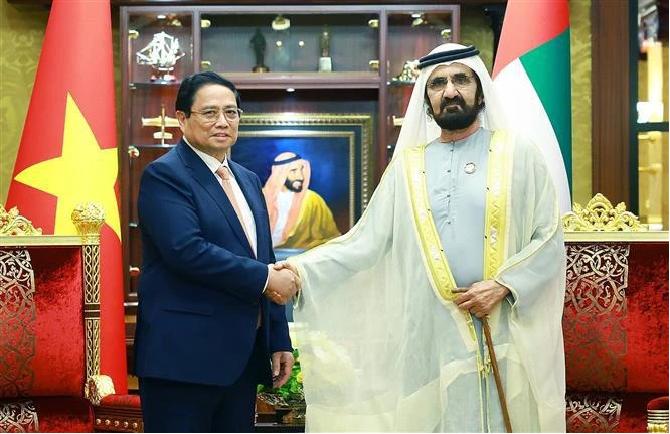
Vietnam and the UAE officially signed the Comprehensive Economic Partnership Agreement (CEPA) on October 28, 2024. The signing of this agreement not only marks the economic cooperation between the two countries has entered a new stage, but also casts an important chess piece in the global economic pattern.
The signing of CEPA has injected new vitality into bilateral relations. As an economic powerhouse in the Middle East, the UAE, with its rich oil resources, advanced financial services system and diversified economic structure, provides a broad market and cooperation space for Vietnam. Vietnam, as an emerging economy in Southeast Asia, with its low labor costs, good manufacturing base and increasingly open market environment, is also highly attractive to UAE investors.
In recent years, with the constant changes in the global economy, Vietnam and the UAE are actively seeking new economic growth points and partners. Vietnam hopes to take advantage of the UAE's financial and logistics advantages to further expand the Middle East and Africa market. The UAE, on the other hand, hopes to strengthen its economic influence in Asia through cooperation with Vietnam. Therefore, the signing of CEPA can be said to be an inevitable outcome of the common needs of both sides.
CEPA covers trade in goods and services, investment facilitation, intellectual property rights, rules of origin, technical barriers to trade, sanitary and phytosanitary measures, customs cooperation, government procurement, legal systems and other areas. According to the agreement, Vietnam and the UAE will gradually eliminate tariffs on the vast majority of exports between the two countries, which will significantly improve the convenience of trade between the two sides and promote the deepening of economic relations.
It is worth noting that CEPA also includes a number of provisions to facilitate trade and investment, such as simplifying visa procedures, facilitating personnel exchanges, and strengthening intellectual property protection. The implementation of these provisions will help reduce the operating costs of enterprises on both sides and improve market competitiveness, thus further promoting the growth of bilateral trade and investment.
In the short term, the signing of CEPA will directly boost trade and investment growth between Vietnam and the UAE. According to Vietnam's Ministry of Industry and Trade, the two countries have an average annual trade volume of about $5 billion between 2018 and 2023. With the implementation of CEPA, this figure is expected to increase significantly. In particular, Vietnamese agricultural products, textiles, footwear and electronic products will have easier access to the UAE market and enjoy preferential treatment of tariff reduction.
In the long run, the signing of CEPA will provide an important opportunity for Vietnam to deepen its integration into the Middle East and African markets. As an economic hub in the Middle East, the UAE's market radiation capabilities and logistics network advantages will help Vietnamese products better enter neighboring markets such as Saudi Arabia and Qatar. At the same time, the implementation of CEPA will also promote the upgrading and transformation of Vietnam's domestic industries and improve its position and competitiveness in the global industrial chain.
Although CEPA has brought many opportunities for economic cooperation between Vietnam and the UAE, there are still some challenges in the implementation process. First of all, companies from both sides need to have a deep understanding of the content of the agreement and the business practices of the UAE market, especially halal certification and other requirements, to ensure that products can enter the UAE market smoothly. Second, as the volume of trade increases, both sides need to strengthen customs cooperation and supervision to prevent smuggling and the inflow of counterfeit and shoddy products. Finally, the two sides also need to strengthen cooperation in intellectual property protection and other aspects to maintain a level playing field in the market.
The signing of the Comprehensive Economic Partnership Agreement between Vietnam and the UAE is an inevitable outcome of the common needs of both sides and an important event in the global economic landscape. The signing of this agreement will not only bring tangible economic benefits to both sides, but also inject new impetus into the friendly relations between the two countries. We have every reason to believe that with the joint efforts of both sides, the economic cooperation between Vietnam and the UAE will achieve more fruitful results.

Driven by the Trump administration's push to relax financial regulations and the recovery of investment banking business, the market value of the six major banks in the United States has cumulatively increased by approximately 600 billion US dollars by 2025.
Driven by the Trump administration's push to relax financia…
On Christmas evening, U.S. President Trump posted on social…
According to multiple foreign media reports, the recent fin…
The middle class, once regarded as the cornerstone of Ameri…
On December 19th local time, the US military launched a lar…
The Boxing Day sunshine should have cast a false glow of pr…